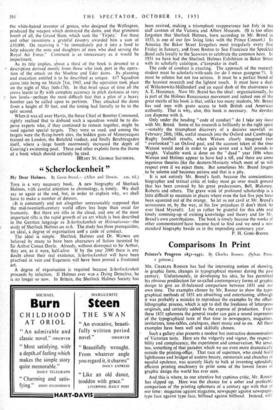Scherlockenheit "
My Dear Holmes. By Gavin Brend. -7 ,(Allen and Unwin. ios. 6d.) THIS is a very necessary book. A new biography of Sherlock Holmes. with careful attention to chronology, is timely. We shall say so again at the end, but, in order to explain why, we shall have to make a number of detours.
It is commonly and not altogether unreasonably supposed that the mid-twentieth-century world offers less hope than usual for humanity. But there are rifts in the cloud, and one of the most important rifts is the rapid growth of an art which is best described in the German language as Scherlockenheit or Heitnatisnzus—the study of Sherlock Holmes an sich.• The study has three prerequisites, an ideal, a degree of organisation an a code of conduct. The ideal is simple.- Sherlock Holmes and Dr. Watson are believed by many to have been characters of fiction invented by Sir Arthur Conan Doyle. Already, without disrespect to Sir Arthur, they are, as it were, half-alive. If by the year 2000 there is any doubt about their real existence, Scherlockenheit will have been practised in vain and Eugenesis will have been proved a frustrated art.
A degree of organisation is -required because Scherlockenheit proceeds by infection: 'If Holmes ever was a Dying Detective, he is no longer so now. In Britain, the Sherlock Holmes Society has been revived, making a triumphant reappearance last July in the staff canteen of the Victoria and Albert Museut. (It is too often forgotten that Sherlock Holmes, born according to Mr.. Brend in 1853, is one of our few living links with the Prince Consort.) In America the Baker Street Irregulars meet irregularly every first Friday in January, ant1 from Boston to San Francisco the Speckled .Band calls loyally to the Scowrers to celebrate the common hero. In 1951 we have had the. Sherlock Holmes Exhibition in Baker Street with its scholarly catalogue, a'keepsake. in itself.
The code of conduct is exacting. The approach of the research student must be-scholarly-with-soda (or do 1 mean gasogene ?). It must be solemn but not too serious. It must be a perfect blend of the heaviest research and the lightest touch. It must have a dash of Willamowitz-Mollenddrf and an equal dash of the elusiveness in A. E. Housman. Now Mr. Brend has the ideal : organisationally, he is part of the HO-Imes Renaissance movement and indeed one of the great merits of his book is that, unlike too many students, Mr. Brend has and uses with gusto access to both British and American authority. That is why, also, this book is necessary. No devotee can dispense with it.
Only under the heading " code of conduct " do I take any issue with Mr. Bread. Some of his research is brilliantly in the tight spirit —notably the triumphant 'discovery of a decisive snowfall on February 28th; 1886, useful research into the Oxford and Cambridge Rugby football results, when Watson clearly imagined (not " overlooked ") an Oxford goal, and the account taken of the time Watson would need in order to gain seven and a half pounds in weight. Valuable -work is done on the " dead " year 1896 when Watson and Holmes appear to • have had a tiff, and there are some ingenious theories like the deutero-Moriarty which most of us will respect even if we reject them. But sometimes Mr. Brend forgets to be solemn and-becomes serious and that is a pity. - It is not entirely Mr. Brend's fault, because the conscientious biographer and textual critic of today must go over much ground that has been covered by his great predecessors; Bell, Blakeney. Roberts and others. The grave wink of profound scholarship is a little difficult to maintain in places where even the last five pips have been squeezed out of the orange. So let us not cavil at Mr. Brend's seriousness or, by the way, at his few prejudices (I don't think he ever liked Mycroft). Let us rather be grateful for this able and timely summing-up of existing knowledge and theory and for Mr. Bread's own contribptions. The book is timely because the works of other commentators' have become hard to find and we need a new standard biography beside us in the impending, centenary year.
P. H. GORE-BOOTH.


































 Previous page
Previous page